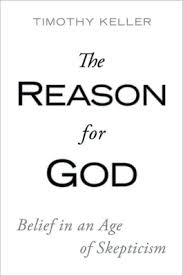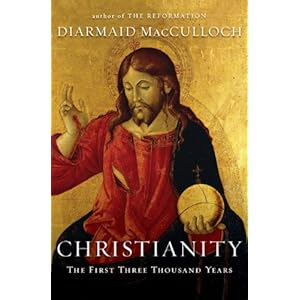 Like: It is reasonable to have faith. The Bible is a reasonable book that conveys reasonable truths that we can reasonably believe. Science has not disproven the Bible or discredited its moral teachings. There is no reason to accept the half-truths of the 'New Atheists', and every reason to re-visit the truths of biblical revelation.
Like: It is reasonable to have faith. The Bible is a reasonable book that conveys reasonable truths that we can reasonably believe. Science has not disproven the Bible or discredited its moral teachings. There is no reason to accept the half-truths of the 'New Atheists', and every reason to re-visit the truths of biblical revelation.Dinesh D'Sousa is clear, straightforward, and enjoyable to read. He meets the New Atheists on their own grounds, and uses their own sources to foil their attacks on religion, and on Christianity in particular. For the most part, his arguments are reasonable. However, just like the New Atheists, D'Souza often earmarks one side of the argument instead of presenting a wholistic look at the issue he is contending. To his credit, D'Souza is a wonderful rhetoritician and a persuasive writer. A certain lack of savvy follows from his inability to grasp the irony of arguing for a logical basis for faith, however. All-in-all though, D'Souza has produced a fine volume to add to the cultural conversation between religionists and anti-religionists.
 Like It Not: A full-on counter-attack to Sam Harris' two landbreaking volumes 'The End of Faith' and 'Letter to a Christian Nation'. The worldview Harris presents in his infamous essays is utterly bankrupt, underscored by a vast ignorance, and nothing more than a charlatan's attempt at pedaling snake-oil metaphysics on a largely ignorant, unobservant culture.
Like It Not: A full-on counter-attack to Sam Harris' two landbreaking volumes 'The End of Faith' and 'Letter to a Christian Nation'. The worldview Harris presents in his infamous essays is utterly bankrupt, underscored by a vast ignorance, and nothing more than a charlatan's attempt at pedaling snake-oil metaphysics on a largely ignorant, unobservant culture.Ravi Zacharias is a prolific writer, and a compelling speaker. A former atheist himself, Zacharias has built up a large ministry to people of differing faiths, and non-faiths alike. His principle aim in this book, it seems, is to dispell the accusations Sam Harris has set out against religious people in general, and Christians specifically. Unfortunately for Zacharias, his book never gets off the ground. It stinks of reactionary emoting, not reasoned, and considerate truth-seeking. Oftentimes, Zacharias moves toward a point but suddenly drops off, leaving the reader attempting to estimate his conclusion, and never returns to finish his idea. He accuses Harris of being fundamentalist in his outlook, but does nothing to soften or diminish Harris' equal accusation that American evangelicalism, and radical Islam are dangerously fundamentalist themselves. More to the point, Zacharias' book, being from a former atheist, falls ironically short of showing why atheism is an illegitimate worldview. One wonders why a scholar of Zacharias' renown and intimate understanding of atheism could not offer a coherent rebuttal of atheism in a book that expressly sets out to do so. Sadly, Zacharias' book is a poor, poor read, and will most likely find its way to a used book store in the near future with a small inscription detailing the impoverished material inside. Caveat emptor, indeed!
 Like: The so-called New Atheists have saddled themselves with the same burden as literalist Christians: they're both fundamentalists. Calling for the end of faith and religion while trumpetting utopian overtures about human moral progress is bipolar thinking at best, and does nothing to promote civil dialogue between atheists and theists. What is needed is not an end to faith, not an end to religion, not a new injection of Enlightenment utopian ideologies but the courage to engage reason where it leads, and embrace religion where it benefits humankind.
Like: The so-called New Atheists have saddled themselves with the same burden as literalist Christians: they're both fundamentalists. Calling for the end of faith and religion while trumpetting utopian overtures about human moral progress is bipolar thinking at best, and does nothing to promote civil dialogue between atheists and theists. What is needed is not an end to faith, not an end to religion, not a new injection of Enlightenment utopian ideologies but the courage to engage reason where it leads, and embrace religion where it benefits humankind.Chris Hedges is a poignant writer. In fact, I found myself elated, disturbed, frightened, and relieved by Hedges's critical appraisal of the New Atheists. And as much as the New Atheists want to balk at the notion of their position being fundamentalist, when their writings are distilled to their lowest elements, they come out just as fundamentalist as any typical literalist Christian group. Be that as it may, however, Hedges does not give quarter to religiosity, but attacks it just as fiercely as neo-atheism. So, all-in-all, Hedges's book is a hard-hitting attack on unthinking faith-heads, just as much as it is an attack on unthinking unfaith-heads. In that respect, it is a fair and balanced read.
 Like It Not: Faith and belief in God have come under attack. Skepticism is undermining believer's confidence in the Word of God. People would do well to understand exactly what is being said about their faith, and exactly how to respond to it so that Christian faith can continue to flourish and nurture not just the believers, but the skeptics, too.
Like It Not: Faith and belief in God have come under attack. Skepticism is undermining believer's confidence in the Word of God. People would do well to understand exactly what is being said about their faith, and exactly how to respond to it so that Christian faith can continue to flourish and nurture not just the believers, but the skeptics, too.Timothy Keller, while he has a wide-open and compassionate heart, comes across far too pedagogical, even cheaply condescending in this epistle. While some of the resources he has mined from are quite creative, they are dulled by the beige use of information he rambles out. More, while Keller seems to have a wide-ranging grasp of literature, philosophy, history, theology, and contemporary music, there is nothing in Keller's presentation of the Christian agenda that would give pause to even the most simple-minded literary atheist. His greatest strength in this book is that he can reduce large concepts into easily accessible and graspable ideas. Unfortunately, that same strength is also his weakness and his undoing: such simple presentations of Christian ideas leaves far too much opportunity to cut against the grain of his logic and undo his conclusions in ways that work against his evangelistic efforts.
 Like: All religions have at their core one essential message: compassion. The expressions we use to convey that compassion are what are known as 'religion'. We can class religion into two distinct spheres: mythos (what is believed and practiced) and logos (what is reasoned and taught). To write-off religion on the basis that it doesn't conform to modern concepts of science and reason is to give-up a great swath of rich cultural heritage, learning, and useful metaphysics that not only inform our deepest human yearnings, but provide the substance that recent skeptics have been parasitically feeding from.
Like: All religions have at their core one essential message: compassion. The expressions we use to convey that compassion are what are known as 'religion'. We can class religion into two distinct spheres: mythos (what is believed and practiced) and logos (what is reasoned and taught). To write-off religion on the basis that it doesn't conform to modern concepts of science and reason is to give-up a great swath of rich cultural heritage, learning, and useful metaphysics that not only inform our deepest human yearnings, but provide the substance that recent skeptics have been parasitically feeding from.Karen Armstrong has done the world a favour with this her latest book. Her writing is clear, sagely, incisive, profound, and beautifully informed. The occasional bursts of dry humour to break the weight of vast historical data are well-placed and drive the reader forward on to new insights and discoveries. After wading through thousands of years of philosophical and religious concepts, Armstrong finally cracks the whip on the New Atheists in her epilogue, giving them a solid scourging for their purposeful ignorance, but at the same time applying salves to their wounds by informing the reader that their perspectives help the religious ask necessary and important questions. There is no shortage of delight to be found in Armstrong's latest book, and I hope every serious student of religion and the philosophy of religion makes use of it to deepen their understandings of the strange creature homo religiosus.







